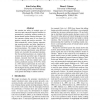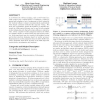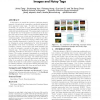437 search results - page 45 / 88 » Using Inverse Resolution to Learn Relations from Experiments |
130
Voted
ATAL
2007
Springer
15 years 8 months ago
2007
Springer
Temporal difference reinforcement learning algorithms are perfectly suited to autonomous agents because they learn directly from an agent’s experience based on sequential actio...
105
Voted
GECCO
2006
Springer
15 years 6 months ago
2006
Springer
This paper investigates reinforcement learning (RL) in XCS. First, it formally shows that XCS implements a method of generalized RL based on linear approximators, in which the usu...
131
Voted
NAACL
2004
15 years 4 months ago
2004
We examine the utility of multiple types of turn-level and contextual linguistic features for automatically predicting student emotions in human-human spoken tutoring dialogues. W...
165
Voted
SIGIR
2012
ACM
13 years 5 months ago
2012
ACM
In crowdsourced relevance judging, each crowd worker typically judges only a small number of examples, yielding a sparse and imbalanced set of judgments in which relatively few wo...
132
click to vote
MM
2009
ACM
15 years 9 months ago
2009
ACM
In this paper, we exploit the problem of inferring images’ semantic concepts from community-contributed images and their associated noisy tags. To infer the concepts more accura...



